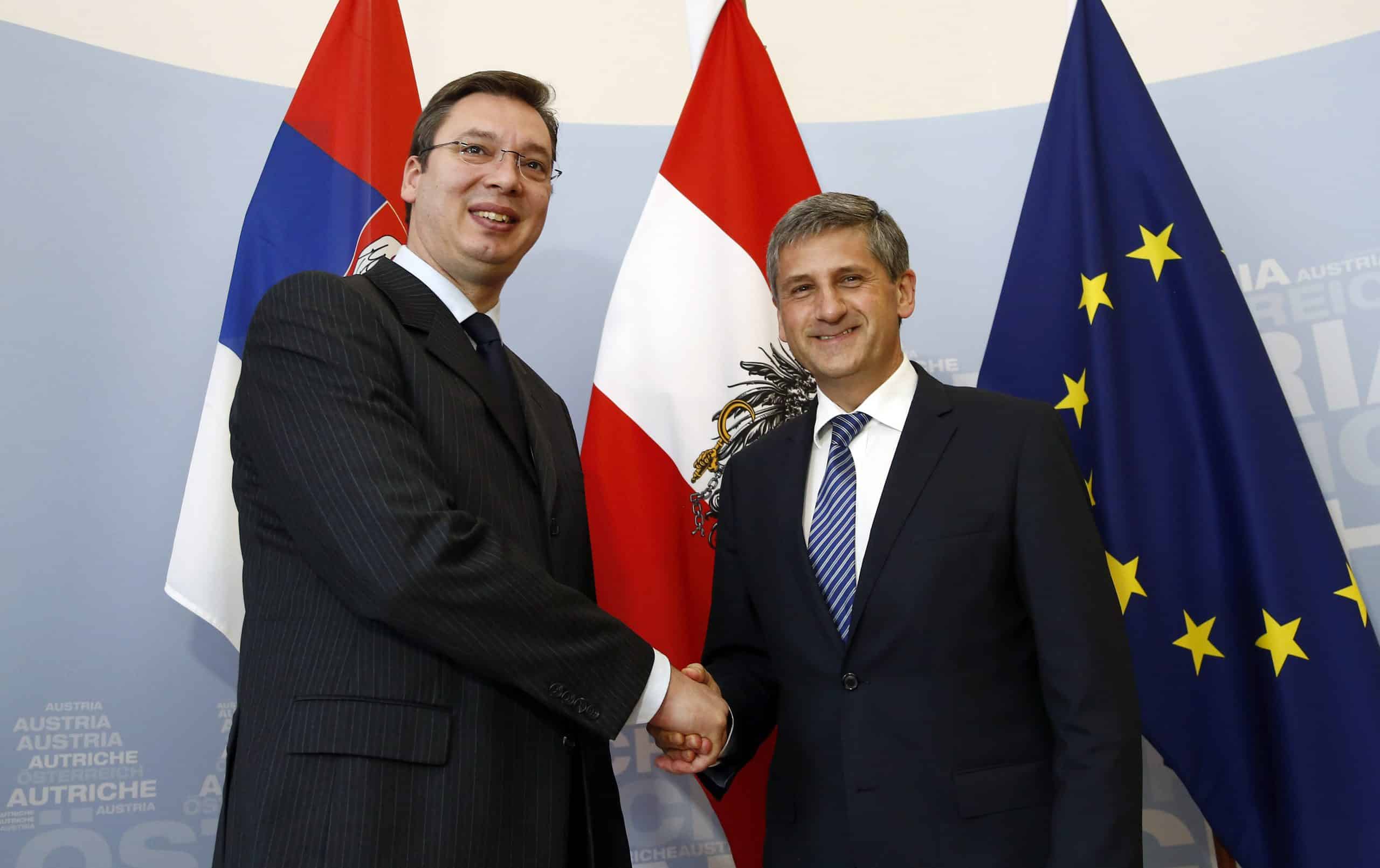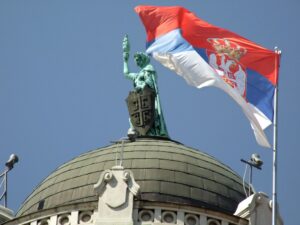The year marked by COVID-19 has reinforced Serbia’s move away from the European Union (EU) and the likelihood of the country becoming an EU member state any time soon is decreasing. Under the guise of combatting the spread of COVID-19, the Serbian government has taken a variety of controversial steps that can be described as the opposite of “making democratic progress”. With regards to its foreign policy-making Serbia is maintaining its strategic position in between the EU, China and Russia. Serbia’s close ties with China and Russia are not a positive influence on its EU accession talks. The recent election win of the left-wing nationalist party in Kosovo is not expected to improve Serbia’s already strenuous relation with Kosovo. For the EU this remains a precondition for Serbian membership to the EU. To top that all of, the EU has once more been reminded how member states can use their veto to block the accession of neighbouring countries, with Bulgaria blocking EU negotiations with North Macedonia over their language dispute.
Backsliding of democratic values in Serbia
Trying to combat the spread of COVID-19, the Serbian government under President Aleksandar Vučić has taken several controversial steps. It has suspended Parliament, thereby silencing the opposition, implemented tight curfews and the police turned increasingly violent against protesters. Investigative journalist have been arrested by the police and the government has been holding back information about the handling of the COVID-19 pandemic. Moreover, the government has retaliated against those healthcare workers who were critical of Serbia’s response to the COVID-19 pandemic.
Such developments are not a new phenomenon occurring in Serbia, but the last year has clearly exposed already existing trends. Serbia’s transition into becoming an EU member was supposed to push the country into becoming more in line with European democratic values. However, under the rule of Vučić the country seems to rejecting European values such as independence of media, free and fair elections and the preservation of other civic liberties. State-organised crime has become shockingly common since Vučić and his Serbian Progressive Party (SNS) took over power. Back in 2013 the situation in Serbia was much more optimistic as the country’s government pledged to step up its fight against corruption. However, in 2020 Serbia has reached its lowest score in the Corruption Perception Index (CPI) in eight years. After several years of improvement, since 2016 there has been a worrying downward trend in terms of its CPI score. Serbia has dropped from a score of 42 – out of 100 – in 2016 to a score of 38 in 2020.
Friendly relations with China and Russia
Serbia is currently involved in a delicate, yet successful, dance with the regional powers that seek to increase their influence in the Balkan peninsula. The country has historically enjoyed friendly relations with Russia and since the collapse of Yugoslavia the country had strengthened those ties again. The Russians were highly critical of NATO involvement in the Yugoslav-wars and have since then been outspoken supporters of Serbia with regards to policy towards Kosovo. Much more recently, the Chinese have become increasingly interested in Serbia. Chinese investments in Serbia have increased drastically over the last ten years. The Serbian government has been very welcoming of such investments in Serbian infrastructure, for instance. The Chinese invest, but do not demand complicated political and economic reforms that only decrease the powerful position of the Vučić government. Paradoxically, the country has become increasingly attractive for Chinese investors due to the economic reforms that Serbia has passed as part of its EU accession process. Such neoliberal reforms have opened up the country for Chinese investments. As a result it is only in the interest of Vučić to play the waiting game with the EU, enjoying the level of attention from the EU, China and Russia at the same time.
A perfect illustration of this is how the government of Vučić has been successful in using its strategic position in the Balkans in its vaccination strategy. Serbia is developing itself as the vaccination hub of the Balkans and has vaccinated more of its population than any of the EU member states. It has done so well, because the country is using the U.S.-German Pfizer-BioNTech-, Russian Sputnik V- and Chinese Sinopharm vaccines. Serbia uses its abundance of vaccinations to influence its neighbours, with its donations to North Macedonia being a prime example. Serbia’s vaccination politics is a perfect illustration of the opportunistic foreign policy-making of the Vučić government. Vučić is aware of the privileged position between the East and West that Serbia is in and uses it to his advantage. It has become increasingly difficult for the EU to convince his government that Serbia would be better off becoming an EU member.
Serbian alternatives for EU membership
Because of the anti-EU rhetoric of Vučić, public opinion on EU membership has steadily decreased, which has its implications on the likelihood of Serbia becoming an EU member in the near future. As virtually all of the media in Serbia are (partially) controlled by Vučić government, the Serbians have a distorted view of the EU. The Serbian government has put much effort into convincing the Serbian public that it is China, not the EU, that Serbia can count on. A majority of people now perceive China as the largest donor of aid and investor in the country, even though European investments remain significantly higher than Chinese investments. 40% of respondent in Serbia thought China was the largest donor to the country, 15% thought it was Russia, while only 18% thought it was the EU. This despite the fact that the Chinese have donated approximately 6.6 million euros, while the EU – without including donations of individual member states – has donated about 1819.2 million euros. The Russians never disclosed official numbers.
EU membership would be beneficial for Serbia as a whole, but that is not the case for the country’s ruling elite. It is in their interest to convince the public that there are alternatives to EU membership. The Chinese have provided the Vučić government with the perfect ammunition and strengthening ties with China is presented as a viable alternative for EU membership. Out of all Balkan states, in Serbia pro-Chinese sentiments are the highest, while anti-EU views are also most common. Only 50% of Serbians would vote to join the EU if they would be asked today, a significantly lower percentage than in other Balkan countries. Meanwhile, only 63% of Serbian respondents held a favourable opinion of Germany, in comparison to 85% for China and 87% for Russia. Vučić is successfully presenting Serbia’s relations with China and Russia as alternatives to EU membership, allowing him to maintain its strategic position in between the regional powers. An independent media outlet could help correct the distorted view presented by Vučić. However, it is exactly this that the EU has so far failed to demand in its negotiation talks with Serbia.
Potential Serbian veto in the EU
Even though enough obstacles for Serbian EU membership have already been listed, the big elephant in the room remains largely undiscussed. A prerequisite for Serbian EU membership is normalisation of Serbian-Kosovan relations. In September of 2020 the ongoing negotiations between Serbia and Kosovo seemed to be going in the right direction, under the supervision of the United States. However, this optimism was short lived and only some minor economic cooperation was agreed upon. Serbia continues to refuse to acknowledge the existence of an independent Kosovan state, while Kosovo is unwilling to do any concession with regards to its territory or Serbian minority. With the landslide election win of the left-wing nationalist Self-determination Movement of Albin Kurti, a settlement has become even more unlikely. With nationalists in power in both countries, representatives are not expected to be able to make many concessions.
Despite the fact that the EU has been pushing for enlargement since its creation, the EU is experiencing the downsides of its rapid growth. Two of its relatively new member states, Hungary and Poland, are backsliding with regards to democratic values. Also with the exit of the United Kingdom, the EU has matters more close at hand. Moreover, the recent Bulgarian veto against starting EU accession negotiations with North Macedonia – over their ongoing language dispute – is a warning for the EU of how a Serbian veto could have implications on future enlargement. Just like the Slovenians vetoed EU membership of its neighbour Croatia – over a minor border dispute – the Serbians could veto EU membership of its neighbours Bosnia-Herzegovina, Montenegro and Kosovo in the future. With this in mind, also from the EU’s perspective, the EU accession process of Serbia has become more and more complicated.
Sources: BalkanInsight1, Clingendael, CPI, Ecfr, Euronews, IRI, NEE, JustSecurity, Rferl1, Rferl2, Rferl3, TS
Image: Wikimedia (Alexander Vučić)



